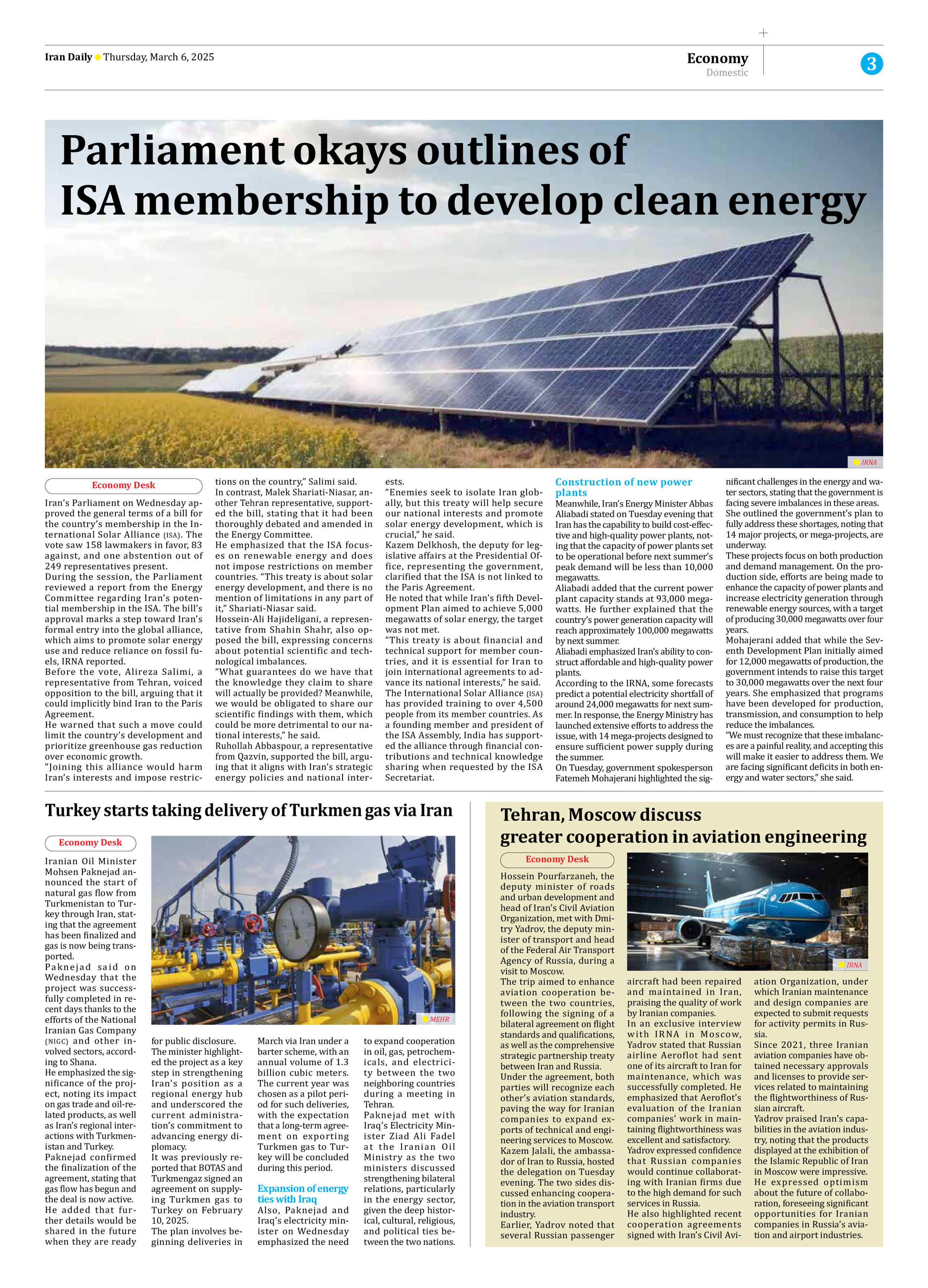
Parliament okays outlines of ISA membership to develop clean energy
Iran’s Parliament on Wednesday approved the general terms of a bill for the country’s membership in the International Solar Alliance (ISA). The vote saw 158 lawmakers in favor, 83 against, and one abstention out of 249 representatives present.
During the session, the Parliament reviewed a report from the Energy Committee regarding Iran’s potential membership in the ISA. The bill’s approval marks a step toward Iran’s formal entry into the global alliance, which aims to promote solar energy use and reduce reliance on fossil fuels, IRNA reported.
Before the vote, Alireza Salimi, a representative from Tehran, voiced opposition to the bill, arguing that it could implicitly bind Iran to the Paris Agreement.
He warned that such a move could limit the country’s development and prioritize greenhouse gas reduction over economic growth.
“Joining this alliance would harm Iran’s interests and impose restrictions on the country,” Salimi said.
In contrast, Malek Shariati-Niasar, another Tehran representative, supported the bill, stating that it had been thoroughly debated and amended in the Energy Committee.
He emphasized that the ISA focuses on renewable energy and does not impose restrictions on member countries. “This treaty is about solar energy development, and there is no mention of limitations in any part of it,” Shariati-Niasar said.
Hossein-Ali Hajideligani, a representative from Shahin Shahr, also opposed the bill, expressing concerns about potential scientific and technological imbalances.
“What guarantees do we have that the knowledge they claim to share will actually be provided? Meanwhile, we would be obligated to share our scientific findings with them, which could be more detrimental to our national interests,” he said.
Ruhollah Abbaspour, a representative from Qazvin, supported the bill, arguing that it aligns with Iran’s strategic energy policies and national interests.
“Enemies seek to isolate Iran globally, but this treaty will help secure our national interests and promote solar energy development, which is crucial,” he said.
Kazem Delkhosh, the deputy for legislative affairs at the Presidential Office, representing the government, clarified that the ISA is not linked to the Paris Agreement.
He noted that while Iran’s fifth Development Plan aimed to achieve 5,000 megawatts of solar energy, the target was not met.
“This treaty is about financial and technical support for member countries, and it is essential for Iran to join international agreements to advance its national interests,” he said.
The International Solar Alliance (ISA) has provided training to over 4,500 people from its member countries. As a founding member and president of the ISA Assembly, India has supported the alliance through financial contributions and technical knowledge sharing when requested by the ISA Secretariat.
Construction of new power plants
Meanwhile, Iran’s Energy Minister Abbas Aliabadi stated on Tuesday evening that Iran has the capability to build cost-effective and high-quality power plants, noting that the capacity of power plants set to be operational before next summer’s peak demand will be less than 10,000 megawatts.
Aliabadi added that the current power plant capacity stands at 93,000 megawatts. He further explained that the country’s power generation capacity will reach approximately 100,000 megawatts by next summer.
Aliabadi emphasized Iran’s ability to construct affordable and high-quality power plants.
According to the IRNA, some forecasts predict a potential electricity shortfall of around 24,000 megawatts for next summer. In response, the Energy Ministry has launched extensive efforts to address the issue, with 14 mega-projects designed to ensure sufficient power supply during the summer.
On Tuesday, government spokesperson Fatemeh Mohajerani highlighted the significant challenges in the energy and water sectors, stating that the government is facing severe imbalances in these areas.
She outlined the government’s plan to fully address these shortages, noting that 14 major projects, or mega-projects, are underway.
These projects focus on both production and demand management. On the production side, efforts are being made to enhance the capacity of power plants and increase electricity generation through renewable energy sources, with a target of producing 30,000 megawatts over four years.
Mohajerani added that while the Seventh Development Plan initially aimed for 12,000 megawatts of production, the government intends to raise this target to 30,000 megawatts over the next four years. She emphasized that programs have been developed for production, transmission, and consumption to help reduce the imbalances.
“We must recognize that these imbalances are a painful reality, and accepting this will make it easier to address them. We are facing significant deficits in both energy and water sectors,” she said.







